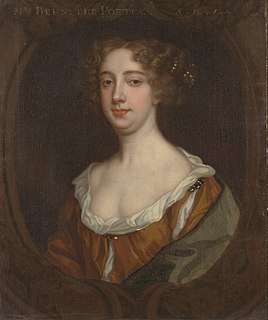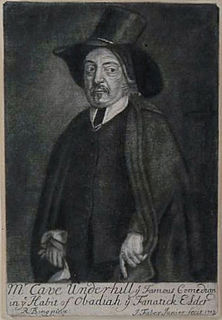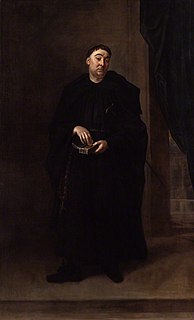| The Spanish Friar | |
|---|---|
 Title page of the first edition (1681) | |
| Written by | John Dryden |
| Date premiered | 1681 |
| Genre | Tragicomedy |
The Spanish Friar, or the Double Discovery is a tragicomedy by John Dryden, produced and published in 1681. [1]
| The Spanish Friar | |
|---|---|
 Title page of the first edition (1681) | |
| Written by | John Dryden |
| Date premiered | 1681 |
| Genre | Tragicomedy |
The Spanish Friar, or the Double Discovery is a tragicomedy by John Dryden, produced and published in 1681. [1]

The tragic part of the plot concerns a usurpation. Torrismond is, unknowingly, the rightful heir to the Spanish throne. He secretly marries Leonora, the unlawful queen, under whose reign Torrismond's father, the true king, has been killed in gaol. [1]
The comic sub‐plot is commanded by the presence of Father Dominic, the eponymous friar, a corpulent and corrupt official who speaks the language of Dissenters and procures women for the hedonistic and politically liberal Lorenzo. Ironically, it is only through Lorenzo's agency that Torrismond is restored. The girl Lorenzo has been pursuing is revealed to be his sister. [1]
The Spanish Friar appears to have been brought out shortly after Thomas Thynne's murder, which is alluded to in the Prologue, probably early in 1681–2. The whimsical caricature, which it presented to the public, in Father Dominic, was received with rapture by the prejudiced spectators, who thought nothing could be exaggerated in the character of a Roman Catholic priest. Yet, the satire was still more severe in the first edition, and afterwards considerably softened. [lower-alpha 1] [2]
It was, as Dryden himself calls it, a Protestant play; Jeremy Collier says it was rare Protestant diversion, and much for the credit of the Reformation. Accordingly, the Spanish Friar was the only play prohibited by James II after his accession. [2]
After the Revolution, the Spanish Friar was the first play represented by order of Mary II, and honoured with her presence; a choice, of which she had abundant reason to repent, as the serious part of the piece gave as much scope for malicious application against herself, as the comic against the religion of her father. [2] An account of the public reaction, with some other particulars, is contained in a letter from the Earl of Nottingham, published by Sir John Dalrymple, from a copy given him by the Bishop of Dromore:
The only day her Majesty gave herself the diversion of a play, and that on which she designed to see another, has furnished the town with discourse for near a month. The choice of the play was The Spanish Friar, the only play forbid by the late K[ing], Some unhappy expressions, among which those that follow, put her in some disorder, and forced her to hold up her fan, and often look behind her, and call for her palatine and hood, and any thing she could next think of; while those who were in the pit before her, turned their heads over their shoulders, and all in general directed their looks towards her, whenever their fancy led them to make any application of what was said. In one place, where the queen of Arragon is going to church in procession, 'tis said by a spectator, 'Very good; she usurps the throne, keeps the old king in prison, and, at the same time, is praying for a blessing on her army;'—And when said, 'That 'tis observed at Court, who weeps, and who wears black for good king Sancho's death,' 'tis said, 'Who is that, that can flatter a Court like this? Can I sooth tyranny? seem pleas'd to see my Royal Master murthered; his crown usurped; a distaff in the throne?'—And 'What title has this queen, but lawless force; and force must pull her down'—Twenty more things are said, which may be wrested to what they were never designed: but however, the observations then made furnished the town with talk, till something else happened, which gave it much occasion for discourse; for another play being ordered to be acted, the queen came not, being taken up with other diversion. She dined with Mrs Gradens, the famous woman in the hall, that sells fine laces and head-dresses; from thence she went to the Jew's, that sells Indian things; to Mrs Ferguson's, De Vett's, Mrs Harrison's, and other Indian houses; but not to Mrs Potter's, though in her way; which caused Mrs Potter to say, that she might as well have hoped for that honour as others, considering that the whole design of bringing the queen and king was managed at her house, and the consultations held there; so that she might as well have thrown away a little money in raffling there, as well as at the other houses: but it seems that my lord Devonshire has got Mrs Potter to be laundress: she has not much countenance of the queen, her daughter still keeping the Indian house her mother had. The same day the queen went to one Mrs Wise's, a famous woman for telling fortunes, but could not prevail with her to tell anything; though to others she has been very true, and has foretold that king James shall came in again, and the duke of Norfolk shall lose his head: the last, I suppose, will naturally be the consequence of the first. These things, however innocent, have passed the censure of the town: and, besides a private reprimand given, the king gave one in public; saying to the queen, that he heard she dined at a bawdy-house, and desired the next time she went, he might go. She said, she had done nothing but what the late queen had done. He asked her, if she meant to make her, her example. More was said on this occasion than ever was known before; but it was borne with all the submission of a good wife, who leaves all to the direction of the k——, and diverts herself with walking six or seven miles a-day, and looking after her buildings, making of fringes, and such like innocent things; and does not meddle in government, though she has better title to do it than the late queen had. [3]

John Dryden was an English poet, literary critic, translator, and playwright who was appointed England's first Poet Laureate in 1668.

Aphra Behn was the first professional woman writer in the English language. She also lays claim to have written the first English novel. She was an English playwright, poet, prose writer and translator from the Restoration era. As one of the first English women to earn her living by her writing, she broke cultural barriers and served as a literary role model for later generations of women authors. Rising from obscurity, she came to the notice of Charles II, who employed her as a spy in Antwerp. Upon her return to London and a probable brief stay in debtors' prison, she began writing for the stage. She belonged to a coterie of poets and famous libertines such as John Wilmot, Lord Rochester. Behn wrote under the pastoral pseudonym Astrea. During the turbulent political times of the Exclusion Crisis, she wrote an epilogue and prologue that brought her into legal trouble; she thereafter devoted most of her writing to prose genres and translations. A staunch supporter of the Stuart line, she declined an invitation from Bishop Burnet to write a welcoming poem to the new king William III. She died shortly after.

Absalom and Achitophel is a celebrated satirical poem by John Dryden, written in heroic couplets and first published in 1681. The poem tells the Biblical tale of the rebellion of Absalom against King David; in this context it is an allegory used to represent a story contemporary to Dryden, concerning King Charles II and the Exclusion Crisis (1679–1681). The poem also references the Popish Plot (1678).

Eleanor Gwyn was a celebrity figure of the Restoration period. Praised by Samuel Pepys for her comic performances as one of the first actresses on the English stage, she became best known for being a long-time mistress of King Charles II of England and Scotland. Called "pretty, witty Nell" by Pepys, she has been regarded as a living embodiment of the spirit of Restoration England and has come to be considered a folk heroine, with a story echoing the rags-to-royalty tale of Cinderella. Gwyn had two sons by King Charles: Charles Beauclerk (1670–1726) and James Beauclerk (1671–1680). Charles was created Earl of Burford and later Duke of St. Albans.
The Mermaid Series was a major collection of reprints of texts from English Elizabethan, Jacobean and Restoration drama. It was launched in 1887 by the British publisher Henry Vizetelly and under the general editorship of Havelock Ellis. Around 1894 the series was taken over by the London firm of T. Fisher Unwin. Many well-known literary figures edited or introduced the texts. Some of the plays published had not been reprinted in recent editions, and most had dropped out of the stage repertoire.

Marriage à la Mode is a Restoration comedy by John Dryden, first performed in London in 1673 by the King's Company. It is written in a combination of prose, blank verse and heroic couplets. It has often been praised as Dryden's best comedic endeavour, and James Sutherland accounts for this by observing that "the comic scenes are beautifully written, and Dryden has taken care to connect them with the serious plot by a number of effective links. He writes with ... one of the most thoughtful treatments of sex and marriage that Restoration comedy can show."

Jacob Tonson, sometimes referred to as Jacob Tonson the Elder (1655–1736), was an eighteenth-century English bookseller and publisher.
Elizabeth Boutell, was a British actress.

King Arthur, or The British Worthy, is a semi-opera in five acts with music by Henry Purcell and a libretto by John Dryden. It was first performed at the Queen's Theatre, Dorset Garden, London, in late May or early June 1691.

Sophie Amalie of Brunswick-Calenberg was Queen of Denmark and Norway as the consort of the King Frederick III of Denmark. She is known for her political influence, as well as for her cultural impact: she acted as the adviser of her husband, and introduced ballet and opera to Denmark.

The heroic drama Oedipus: A Tragedy, is an adaption of Sophocles' Oedipus Rex, written by John Dryden and Nathaniel Lee. After being licensed in 1678 and published in 1679, it became a huge success on stage during the Restoration period.
Match me in London is a Jacobean era tragicomedy written by Thomas Dekker. It was written around 1621 and was relicensed without fee by George Buc on 21 August 1623 as 'an Old Playe'. On 8 November 1630 it was entered in the Stationers' Register and printed in a quarto in 1631. The play was dedicated to 'The Noble Lover, of the Muses, Lodowick Carlell, Esquire, Gentleman of the Bowes, and Groome of the King, and Queene's Privy-Chamber'.
The Devil's Law Case is a Jacobean era stage play, a tragicomedy written by John Webster, and first published in 1623.
Beggars' Bush is a Jacobean era stage play, a comedy in the canon of John Fletcher and his collaborators that is a focus of dispute among scholars and critics.

Mary Saunderson (1637–1712), later known as Mary Saunderson Betterton after her marriage to Thomas Betterton, was an actress and singer in England during the 1660s and 1690s. She is considered one of the first English actresses.
Mary Knep, also Knepp, Nepp, Knip, or Knipp, was an English actress and one of the first generation of female performers to appear on the public stage during the Restoration era.

Cave Underhill (1634–1710?) was an English actor in comedy roles.

Anthony Leigh was a celebrated English comic actor.
Mary, Lady Slingsby, born Aldridge, was an English actress. After a marriage lasting 1670 to 1680 to John Lee, an actor, during which she was on the stage as Mrs. Lee, she was widowed. She then married Sir Charles Slingsby, 2nd Baronet, a nephew of Sir Robert Slingsby, and performed as Lady Slingsby. Theatre historians have pointed out the difficulty in identifying her roles in the period when Elinor Leigh, wife of Anthony Leigh, was performing as Mrs. Leigh, because the homophones "Lee" and "Leigh" were not consistently spelled at the time.
The Cruel Gift: A Tragedy is a tragedy written by Susanna Centlivre, first performed at Drury Lane in 1716. Nicholas Rowe wrote the play's epilogue.